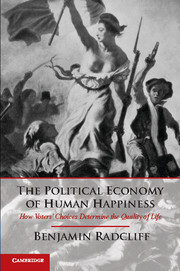Book contents
- Frontmatter
- Contents
- Acknowledgments
- Introduction
- 1 The Democratic Pursuit of Happiness
- 2 Market Democracy
- 3 Citizens or Market Participants?
- 4 The Scientific Study of Happiness
- 5 The Size of the State
- 6 Labor Unions and Economic Regulation
- 7 The American States
- 8 Between Market and Morality
- References
- Index
8 - Between Market and Morality
Published online by Cambridge University Press: 05 March 2013
- Frontmatter
- Contents
- Acknowledgments
- Introduction
- 1 The Democratic Pursuit of Happiness
- 2 Market Democracy
- 3 Citizens or Market Participants?
- 4 The Scientific Study of Happiness
- 5 The Size of the State
- 6 Labor Unions and Economic Regulation
- 7 The American States
- 8 Between Market and Morality
- References
- Index
Summary
The empirical findings and theoretical arguments advanced in prior chapters do not by this point require further rehearsal. They can be summarized most succinctly. In the debate between Left and Right over the scope or size of the state, it is eminently clear that “big government” is more conducive to human well-being. As we have seen, the surest way to maximize the degree to which people positively evaluate the quality of their lives is to create generous, universalistic, and truly decommodifying welfare states. The greater the “social wage” that society pays its members, the happier people tend to be. Similarly, satisfying lives are best nurtured by larger state sectors, wherein a larger share of the economy is “consumed” by government in furtherance of the goal of providing public services beyond the immediate subsidies provided through cash subsidies (“transfer payments”) to individuals and families. Overall, it is clear that the quality of human life improves as more of the productive capacity of society comes under political – which is to say, democratic – control. This subjection of the market to democracy thus appears to promote human happiness in precisely the way that advocates of social democracy have always argued.
Similar conclusions emerge when considering political regulation of the economy. Labor market regulations that establish comparatively strong protections for workers appear to achieve their end of making life a more agreeable experience. The empirical evidence is unambiguous: the more we rely on the law to protect employees rather than trust in the market to do so, the more satisfied people tend to be.
- Type
- Chapter
- Information
- The Political Economy of Human HappinessHow Voters' Choices Determine the Quality of Life, pp. 177 - 188Publisher: Cambridge University PressPrint publication year: 2013



